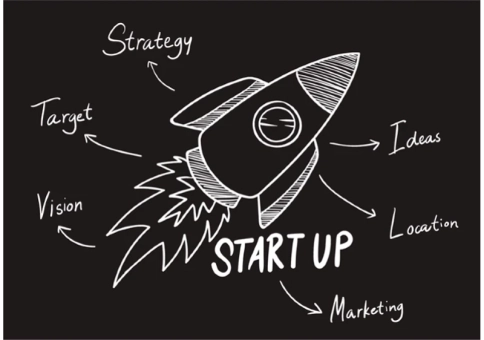Startup vs. Business: What Is the Difference?
In the IT game, there are two main players: startups and established businesses. These two are like different roads on the same map, each having its unique scenery and characteristics, but leading, hopefully, to the same destination. To help you navigate the complex product development landscape, we'll break down the difference between a startup and a business, looking at each aspect one by one.
If we’re talking about the general difference, everyone knows how it works: startups are pioneers, just starting their way and always looking for new ideas and ways to shake things up. On the other hand, businesses the steady workers, known for their reliability and stability. In this post, we're going to talk specifics and compare startups and businesses in terms of their growth speed, financial expectations, team structure, and much more. Whether you're thinking about your career, planning to launch a company, or considering investments, understanding these differences can be a game-changer.
Technologies and Innovations
Let’s start our startup vs small business comparison journey with the thing that every IT company revolves around — technology.
Startups are the pioneers of technological innovation in the IT industry. They leverage cutting-edge technologies, such as artificial intelligence, machine learning, and blockchain, to create state-of-the-art solutions. Startups are driven by the relentless pursuit of innovation, always seeking novel ways to solve problems and capture emerging market opportunities. This innovation-first mindset allows startups to take risks and experiment with new ideas, as they don't have the constraints of legacy systems or existing market share to protect. It’s all about being one-of-a-kind — startups strive to create unique and groundbreaking products or services.
Established businesses, in their turn, can also embrace technology, but they tend to adopt a more cautious approach. They prioritize reliability and stability, often opting for proven technologies that are less risky. Larger companies aim to maintain and optimize their existing operations while making incremental improvements. They understand the importance of maintaining a stable customer base and, therefore, avoid radical technological shifts that could disrupt their established customer relationships. They typically offer products or services that are similar to what many other companies in their industry provide. While they also still seek growth and improvement, their focus is often on gradual and steady development rather than completely changing the game.
Scale and Scope
Startups are like specialized boutiques in the business world. They usually start with a narrow focus, targeting niche markets or specific customer segments. This allows startups to provide highly tailored and personalized solutions. The scope of startups is intentionally limited, enabling them to deeply understand their customers' pain points and deliver solutions that are precisely aligned with these needs. This focus on specialization gives startups a competitive edge in their chosen niches.
Continuing with the shopping analogies, established businesses are like department stores, offering a wide variety of products or services to reach a larger audience. They have a broader scope, serving a diverse customer base and addressing a wide range of needs. While this broad reach allows them to tap into a larger market, it can sometimes make them less flexible in adapting to the unique requirements of individual customers.
Image by pch.vector on Freepik
Growth rate
In terms of running a business (pun intended), startups are sprinters, racing to achieve rapid growth and market penetration in a relatively short time. Their goal is to capture a significant share of the market quickly. This rapid growth is fueled by innovative products, aggressive marketing, and the ability to adapt to changing customer preferences. Startups are often prepared to accept losses early on, as they prioritize achieving a substantial market presence.
Established companies, however, are more like marathon runners, focusing on steady, sustainable growth over the long term. Their growth rates are predictable and in line with industry averages. Instead of rapid expansion, established businesses aim to maintain their market position and customer loyalty. Their emphasis is on efficiency, operational stability, and gradual improvements.
Potential Profit and Finances
When comparing businesses, there is no way to skip the money part. Startups have their eyes on long-term profitability, and their business models are designed to prioritize scalability over immediate returns. They often operate at a loss initially, reinvesting their funds to capture market share, innovate, and build brand recognition. Startups anticipate substantial profits in the future, particularly if they can successfully disrupt markets or create new ones. Funding for startups often comes from venture capitalists, angel investors, or crowdfunding platforms, as they seek external capital to fund their ambitious growth plans.
Established companies prioritize consistent, reliable profitability from the very beginning. They operate with the expectation of generating steady profits to support their ongoing operations, pay employees, and provide returns to shareholders. The focus is on financial stability and the ability to deliver value to stakeholders immediately. They have existing revenue streams, and their financial operations are often supported by retained earnings. While they may seek financing for expansion, it's more likely to come from traditional business loans or by reinvesting their profits.
Company Lifecycle
The lifecycle of a startup can be divided into several stages, such as ideation, prototype development, market-entry, rapid growth, and scaling. Startups are characterized by a high degree of uncertainty, as they navigate these stages and often pivot in response to market feedback. The primary emphasis is on innovation, market disruption, and gaining an initial foothold in their chosen sector.
Established businesses have a more predictable and stable lifecycle, which includes continuous operation, gradual growth, and consistent product or service delivery. They've already overcome the initial challenges faced by startups and now focus on maintaining their market position, refining existing processes, and adapting to evolving market conditions.
Team and management
When talking about the SME vs startup battle, it’s vital to talk about the people. Startups operate with smaller, more versatile teams. In these dynamic environments, roles often overlap, and employees frequently wear multiple hats to address a variety of needs. The emphasis is on adaptability, creativity, and rapid decision-making. Startups value a flat organizational structure that encourages open communication and collaboration among team members.
Larger businesses have larger and more specialized teams. They are often structured hierarchically, with well-defined responsibilities and roles. Such labor division ensures that employees have specific functions, fostering efficiency and stability within the organization. The focus is on managing larger workforces effectively and maintaining smooth operations.
Way of life
While this factor might vary from one company to another, we can't help but mention that the lifestyles of people working for startups vs businesses are completely different. Working in a startup is akin to a high-stakes adventure. Employees often experience long working hours, high levels of unpredictability, and a strong sense of responsibility. The dynamic environment necessitates adaptability, resilience, and the ability to thrive in situations where roles and responsibilities can shift rapidly.
Established companies promise a more structured work-life balance. They adhere to regular working hours, offer more predictability, and maintain a stable work environment. The workplace culture is less frenetic, allowing employees to follow a consistent daily routine.
Exit strategy
Startups consider various exit strategies as they grow and create substantial value. These strategies can include acquisition by a larger company, that recognizes the startup's innovation and wishes to incorporate it into their operations. Alternatively, startups might opt to go public through an Initial Public Offering (IPO) to raise capital, increase their visibility, and provide liquidity to early investors and employees.
Small and medium businesses also contemplate exit strategies, particularly as part of long-term strategic planning. These strategies can include mergers with other companies, divestitures of non-core assets, or succession planning in the case of family-owned businesses. The focus is on maintaining stability and maximizing the value of the business for stakeholders.
Regulatory Compliance and Legal Considerations
Startups often have fewer legal and regulatory obligations in their early stages, allowing them to move quickly. However, as they grow and enter new markets, they may face increasing legal complexities and compliance requirements. Navigating these challenges can be a learning curve for startups.
In their turn, businesses have well-established legal departments and compliance frameworks. They've already addressed many of the regulatory challenges that startups face when entering the market. While they benefit from experience and expertise, they may find it challenging to innovate and adapt quickly while maintaining compliance.
Risk and Resilience
Last but not least factor to talk about is risk. Startups are no strangers to it. They operate in an environment of uncertainty and often face the risk of failure due to market fluctuations, competition, or inadequate funding. However, their nimble nature allows them to pivot quickly in response to challenges. This resilience is a core characteristic of startups, as they must adapt to survive in a volatile market.
Established companies, having weathered their early years, may appear even more resilient, but they often face risks associated with complacency, resistance to change, or competition from agile startups. While they have the benefit of a stable customer base, they must also adapt to evolving market conditions to maintain their resilience in the long term.
Image by johnstocker on Freepik
Final Word
In the IT industry, the choice between a startup and an established business is akin to selecting the right tool for the job. It's not about pitting one against the other but about recognizing the strengths and weaknesses of each path.
Startups are the pioneers of innovation, driven by the thrill of discovering new horizons. They're agile, risk-takers, and innovators at heart. For those who crave excitement, creativity, and the potential to disrupt industries, startups offer a thrilling adventure.
In contrast, established businesses are the pillars of stability and reliability. They provide a consistent work environment, a structured work-life balance, and a proven track record of success. For those who value security, established businesses offer the comfort of a familiar journey.
Ultimately, whether you're considering your career, planning your next business move, or weighing investment opportunities, understanding the differences between startups and established businesses is essential. In the dynamic IT landscape, both startups and established businesses have their roles to play, and each has a unique contribution to make. The key is to align your choices with your vision and find the path that best suits your journey.
FAQ
- What is the main difference between a startup and a business?
The primary difference lies in their stage of development and approach. Startups are typically in their initial phases, focusing on innovation, rapid growth, and capturing market share. Businesses, on the other hand, are established and prioritize stability, reliability, and maintaining their market position.
- Is it better to work in a startup or a small business?
The answer depends on your preferences and career goals. Startups offer a dynamic, innovative environment but come with higher uncertainty. Small businesses provide stability and structured work but may have less room for rapid career growth. The choice should align with your aspirations.
- How long does it take for a startup to turn into an established business?
The timeframe varies widely. Some startups become established businesses in a few years, while others may take a decade or more. It depends on various factors, including industry, market conditions, and the startup's growth rate.











